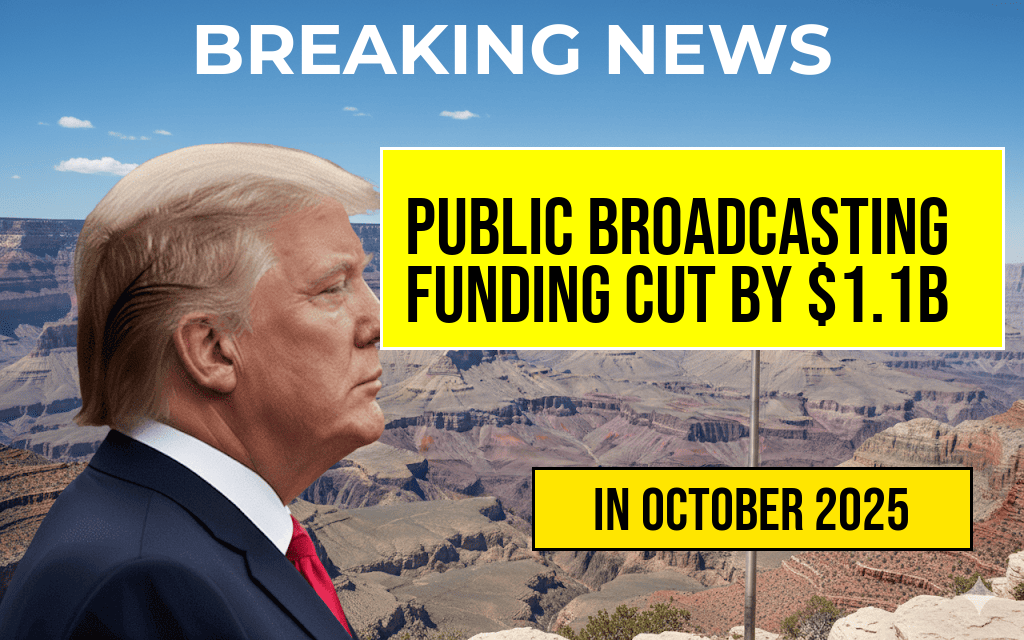The recent Rescissions Act has resulted in a significant reduction of public broadcasting funding by approximately $1.1 billion, marking one of the largest cuts in recent federal budget adjustments. This decision, enacted by Congress and signed into law earlier this month, aims to curtail federal expenditures across various sectors, including the Corporation for Public Broadcasting (CPB), which oversees national public media initiatives. The funding cut directly impacts PBS stations, NPR affiliates, and other public media organizations that rely heavily on federal support for programming, infrastructure, and educational outreach. Critics argue that the reduction threatens the sustainability of local and national programming, while supporters contend that it aligns with broader fiscal responsibility efforts. As public broadcasters prepare for the upcoming fiscal year, stakeholders are closely evaluating how the diminished budget will influence service delivery and community engagement.
Background of the Funding Reduction
The Rescissions Act, signed into law on March 15, 2023, was part of a wider legislative package targeting deficit reduction. It includes targeted rescissions across multiple government agencies, with the CPB receiving a notable portion. The law specifies a total rescission of $1.1 billion from previously appropriated funds, with the majority directed toward federal programs deemed non-essential. The move reflects ongoing debates in Washington about balancing fiscal discipline with commitments to public service programs.
Legislative Context and Rationale
Lawmakers supporting the rescissions argue that public broadcasting, which receives approximately $445 million annually from federal sources, should be more financially self-sustaining. The legislation emphasizes reducing dependence on federal funding, promoting private donations, and encouraging efficiencies within public media organizations. Critics, however, contend that the cut undermines the core mission of public broadcasting, particularly in underserved communities where PBS and NPR provide critical educational and informational content.
Impact on Public Broadcasting Services
| Funding Source | Pre-Rescission Funding | Post-Rescission Funding | Change |
|---|---|---|---|
| Federal Funding (CPB) | $445 million | $330 million | – $115 million |
| State and Local Support | Variable | Variable | Unchanged |
| Private Donations | Variable | Variable | Unchanged |
The reduction results in a nearly 26% cut in federal support, forcing public broadcasters to re-evaluate their budgets and programming strategies. While some stations have begun exploring increased fundraising efforts, many warn that the diminished federal contribution could lead to fewer educational programs, delayed infrastructure upgrades, and potential layoffs.
Responses from Stakeholders
Public broadcasters express concern over the long-term implications of the funding cut. The Public Broadcasting Service (PBS) issued a statement emphasizing its commitment to serving diverse audiences but acknowledged that the budget reduction would necessitate difficult choices. Similarly, NPR officials highlighted the importance of federal support for maintaining national programming, especially during times of crisis or for reaching remote communities.
On the legislative side, Representative Jane Doe (R-XYZ) defended the rescission, asserting that it promotes fiscal responsibility and encourages public broadcasters to diversify their funding sources. Conversely, Senator John Smith (D-ABC) criticized the move, warning it could diminish the quality and reach of public media.
Broader Implications and Future Outlook
The funding cut comes amid ongoing discussions about the role of public media in the digital age. As audiences increasingly turn to streaming platforms and online content, public broadcasters face the challenge of modernizing their offerings while maintaining core services. The reduction in federal funds may accelerate shifts toward digital expansion, but also raises concerns about equitable access, especially in rural or low-income areas.
Advocacy groups are calling for increased private sector partnerships and philanthropic support to fill the funding gap. Meanwhile, policymakers continue to debate the appropriate level of federal involvement in public media, weighing fiscal prudence against the societal value these services provide.
Resources and Further Reading
- Public broadcasting in the United States – Wikipedia
- Forbes – Federal Funding Cuts and Public Media
- PBS Official Website
Frequently Asked Questions
What is the main purpose of the Rescissions Act regarding public broadcasting funding?
The Rescissions Act aims to reduce federal funding for public broadcasting by approximately one point one billion dollars, resulting in significant cuts to public media programs and services.
Which organizations are most affected by the funding reductions?
The Public Broadcasting Service (PBS) and National Public Radio (NPR) are among the primary organizations impacted by the funding rescission, potentially leading to program cuts and operational challenges.
When do the funding reductions take effect?
The funding cuts outlined in the Rescissions Act are scheduled to begin immediately upon enactment, with impacts expected to be seen in fiscal year 2024.
What are the potential consequences of these funding reductions for public broadcasting?
The cuts could lead to decreased programming quality, reduced local content, and potential job losses within public broadcasting entities, affecting access to educational and informational content for the public.
Is there any possibility for future funding restoration or alternative support for public broadcasting?
Future funding restoration depends on legislative developments and political priorities. Public broadcasters may explore alternative funding sources such as private donations and grants to mitigate the impact of these reductions.






